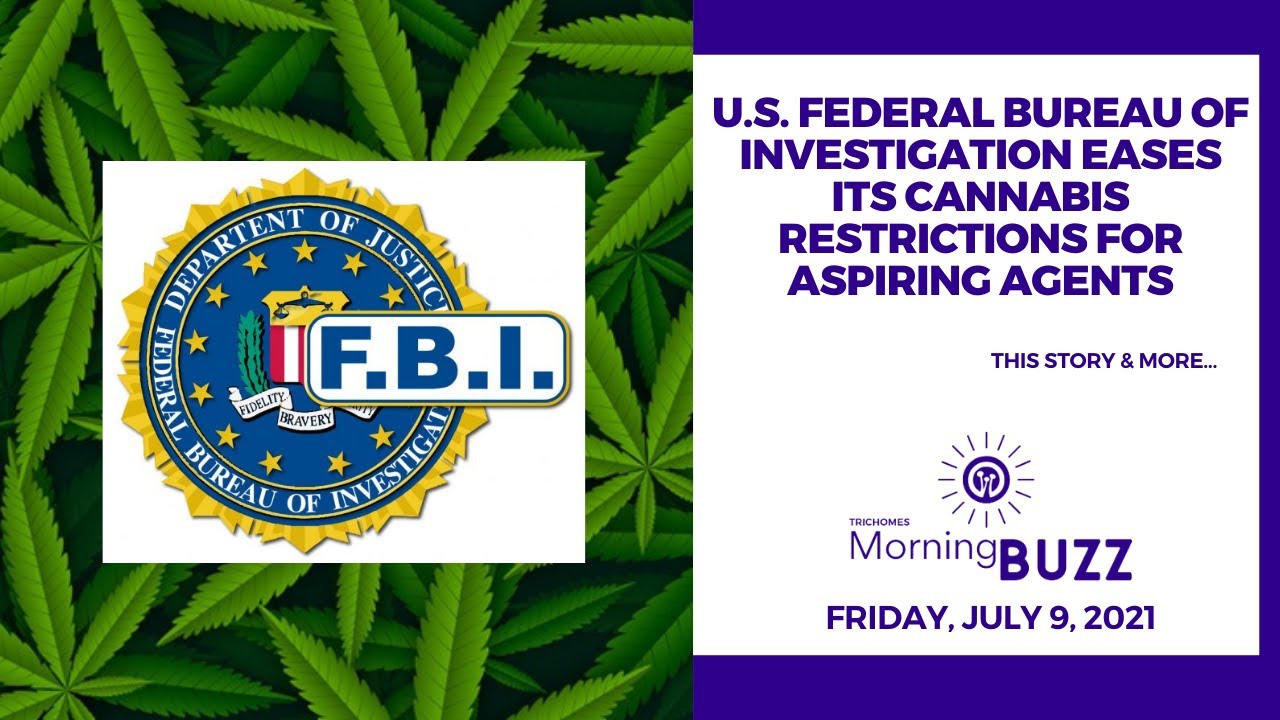Cannabis News Update July 9, 2021
Today in cannabis news: Nevada state sports commissioners drop cannabis restrictions for professional fighters following U.S. track athlete Sha’Carri Richardson’s Olympic disqualification; the U.S. federal government opens a public comment period on the “systemic barriers” that drug laws generate and their impacts on “underserved communities;” and the U.S. Federal Bureau of Investigation eases its cannabis restrictions for aspiring agents.
The Morning Buzz presented by TRICHOMES brings you late-breaking news that tells you what’s happening within the cannabis industry. Check in with the cannabis community at TRICHOMES.com
** First up: Nevada state sports commissioners agreed this week to eliminate penalties for athletes, such as MMA fighters and boxers, who test positive for cannabis. This comes at a period when drug screening regulations in athletics are under intense nationwide criticism.
The Nevada Athletic Commission (NAC) voted unanimously to implement the policy shift, which will update the state’s anti-doping code and erase the danger of punishment for competitors who consume or carry cannabis. Fighters who appear clearly inebriated will still be prohibited from competing. The decision comes after renowned U.S. sprinter and Olympian Sha’Carri Richardson was controversially barred from competing in the Olympics after testing positive for cannabis in a legal region.
In January, The U.S. Anti-Doping Agency (USADA) and the Ultimate Fighting Championship (UFC) declared that they would stop penalizing fighters for testing positive for cannabis. National UFC competition, though, is not part of the global Olympics and so isn’t bound to the stricter World Anti-Doping Agency (WADA) regulations.
USA Track & Field (USATF) stated in a press release that it is presently resistant to changing its own internal policies to provide an exemption in Richardson’s situation, but that global regulation on cannabis consequences for athletes “should be reevaluated.”
** Next up: The U.S. federal government’s drug policy office wants to know if its current regulations are generating “systemic barriers to opportunities for underserved communities” and if new programs may be devised to improve equity. It’s also looking for suggestions on how to better incorporate drug users in the development of regulations that impact them.
In a statement submitted to the Federal Register this week, the Office of National Drug Control Policy (ONDCP) introduced a 30-day public comment period. Reformers will almost certainly seize the moment, especially as the drug czar’s office has a history of opposing policy improvements such as cannabis legalization that could assist in undoing the detriments of federal prohibition.
Nonetheless, the report does not indicate that the ONDCP is seeking opinions on the equity effects of the many departments and grant programs it administers on its own. Instead, it was made public as part of an executive order issued by President Joe Biden in January.
To influence its subsequent efforts, the ONDCP says it is looking for “more perspectives from a wide array of backgrounds, including those most impacted by United States’ drug policies.”
The agency presently oversees initiatives such as the High Intensity Drug Trafficking Areas Program, which supports the War on Drugs, in which people of color are disproportionately detained, convicted, and imprisoned.
** Last up: The U.S. Federal Bureau of Investigation (FBI) has eased the requirements for aspiring agents who have recently consumed cannabis. The update in cannabis policy was not announced in an official manner by the agency.
The FBI discreetly adjusted its employment practices over the last month, making it so that applicants are only immediately dismissed from entering the organization if they confess to having consumed cannabis within a year of having applied. This is one of the newest indications that the cannabis policy reformation wave is having a federal influence as additional states implement legalization measures. Prior to this, potential agency personnel could not have consumed cannabis in the last three years.
Additionally, FBI policy was updated so that cannabis use “before the candidate’s 18th birthday is not a disqualifier for FBI employment,” although “adjudicative personnel will evaluate the candidate by using the ‘whole-person concept.’”
This comes a year following an FBI division announcing it was “looking into changing internal policy when it comes to the use of CBD products by its agents and other employees” because hemp-derived CBD is now federally legal.
#CannabisNews #CannabisLegalization #DailyNews
source



